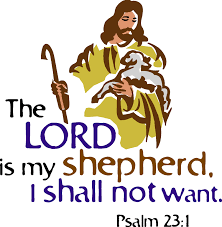John 10:11 – "I am the good shepherd. The good shepherd lays down his life for the sheep."
Jesus continues on with the parable of the sheep.
 God provided this parable to the Jews so they could understand that Jesus the Messiah was the true head shepherd of all his people, Jew and Gentile alike. Therefore, the people should follow Jesus into the pasture of Grace, instead of listening to the Scribes and Pharisees who wanted to rob them of the gospel.
God provided this parable to the Jews so they could understand that Jesus the Messiah was the true head shepherd of all his people, Jew and Gentile alike. Therefore, the people should follow Jesus into the pasture of Grace, instead of listening to the Scribes and Pharisees who wanted to rob them of the gospel. In our last post, we ended by noting that spiritual 'thieves and robbers' come into the flock with evil intentions - to steal, kill and destroy. By contrast, Jesus is wholly good – he has come to bring life.
In fact, Jesus lays down his own life for the sheep. In the natural realm, a good shepherd will stand between his flock and anything that tries to kill them. For example, in his role as a shepherd, King David slew both a bear and a lion as they came to devour the sheep under his care (I Samuel 17:34-36).
Spiritual shepherds also place themselves in harm's way for the spiritual well being of their flocks. For instance, the apostle Paul gladly suffered so that the message of salvation could come to the lost:
Acts 20:23-24 - Holy Spirit witnesses in every city, saying that bonds and afflictions await me. But none of these things move me, neither count I my life dear unto myself, so that I might finish my course with joy, and the ministry, which I have received of the Lord Jesus, to testify the gospel of the grace of God.
And while all of the apostles (except for John) eventually did die for their testimony of Christ, only the head shepherd, Jesus, had the ability to sacrifice his life to purchase the flock – to satisfy the debt of their sin; to provide his blood for the washing and cleansing of their souls (Acts 20:28).
John 10:12-13 – "He who is a hired hand and not a shepherd, who does not own the sheep, sees the wolf coming and leaves the sheep and flees, and the wolf snatches them and scatters them. He flees because he is a hired hand and cares nothing for the sheep."
In today's vernacular, we would call a hired hand an employee; a person paid to do a job, who normally has no stake in the company.
For example, a bank teller. In some ways, we could say a bank teller oversees or guards your money. They keep it locked up tight, only giving access to you. They get paid (they profit) from performing this duty. And as long as nothing unusual or dangerous occurs, they stay on the job.

But what if a thief/robber came into the bank with a gun? In all honesty, I have never worked at a bank. But my guess is that if a robber came into the bank with a gun, the teller would not protest, or try to fight them off. They are more likely to give the robber all the money in the bank, including yours. After all, why would they risk losing their life for your money? What is their incentive to protect it?
In the same way, the employee of a sheep farm profits by simply showing up and carrying out his duties. He has no incentive to risk his life when he sees a lion or wolf coming to steal a sheep from the flock; the sheep are not his and he does not experience loss if one is stolen.
The bible tells us that there are some spiritual leaders who act as unfaithful 'hired hands' instead of true shepherds. They live off the flock without fulfilling their proper duties (Zechariah 11:15-17); they do not lead their flocks to good pasture, tend to their wounds or worry about those that were lost/separated from the flock.
These pastor 'hirelings' took their office to gain worldly goods or respect, not as an opportunity of serving Christ and doing good. We know that when God truly calls a person to be a pastor, he gives them a measure of his love which enables them to see, love and care for the sheep as if they were his/her own. As a result, they love the sheep just as God does.
John 21:17- He said unto him the third time, Simon, son of Jonas, do you love me? Peter was grieved because he said unto him the third time, Do you love me? And he said unto him, Lord, you know all things; you know that I love you. Jesus said unto him, Feed my sheep.
However, as we mentioned previously, the hired hand does not have a love for the sheep that God gives to the true pastor whom he specifically calls. They are not really concerned with the souls of others; if trouble comes they will abandon the flock in an effort to save themselves. Meanwhile, the helpless sheep will be destroyed by Satan (Ezekiel 34:2-6).
John 10:14-15 – "I am the good shepherd. I know my own and my own know me just as the Father knows me and I know the Father; and I lay down my life for the sheep."
In this instance, the word 'know' is used in the sense of affectionate regard or love. The implication is that Jesus has an intimate knowledge of the physical and spiritual growth of his people. He knows their wants, needs and desires. He is well aware of the dangers they face both now and in the future. The sheep are his and he has a tender love and deep interest in their welfare. Therefore, he leads, defends, corrects and aids them.
This relationship goes both ways. Each individual Christian (sheep) recognizes Jesus as Lord, Savior and intimate friend. We spend our daily lives in constant communion with him, sharing both our sorrows and joys. We trust and obey him, because we love him John 15:10).
When we are in trouble, we can call out to him, and he is right there with us. He leads us on the paths of righteousness and even accompanies us as we experience physical death. When we do pass from this life, he is right there on the other side of eternity, rejoicing because we are now home with him! What would we ever do without him??
Our relationship with Jesus mirrors the relationship between Jesus and Father God. They know each other; they love and delight in each other. As proof of the greatness and extent of his love for both the Father and us, Jesus will lay down his life for the sheep, which no mere hireling could ever do.
Jesus often compares the love he has for us to the love that Father God has for him (John 15:9, John 17:23,26). Therefore, if we can believe that God loved his only begotten Son, we can be assured that loves us as well. The love of Christ towards us is as genuine and certain as the Fathers love for Jesus.
John 10:16 – "And I have other sheep that are not of this fold. I must bring them also, and they will listen to my voice."
This verse reveals the plan of God for the salvation of the world (Gentiles), which was revealed/promised to Abraham hundreds of years before:
Genesis 22:18 - And in your descendants shall all the nations of the earth be blessed; because you have obeyed my voice.
When we recall the promise of God to bless the world through the Jewish nation, we tend to think exclusively about Jesus being born as a Jew. But there is more to it than just that. It also reveals the order in which God planned to distribute the good news of the gospel - to the Jews first and only then to the Gentiles (Romans 1:16).
This makes perfect sense. After all, the Jews (not the Gentiles), held the promises of God through the first covenant; they were already in a relationship with God that the Gentiles never had.
And that is exactly what happened - during his time on earth, Jesus dealt almost exclusively with the Jews:
Matthew 15:24 - But he [Jesus] answered and said, I am not sent but unto the lost sheep of the house of Israel.
Once the gospel had been entrusted to the Jews (particularly the twelve apostles), they were to bless all nations by introducing them to God through the gospel message. This was a clear command given by Jesus:
Matthew 28:19 - Go you therefore, and teach all nations, baptizing them in the name of the Father, and of the Son, and of the Holy Spirit:
Furthermore, we know that the spread of the gospel began at a central point (Jerusalem) and then spread out from that point in all directions (Acts 1:8) and in all generations, until it finally reached you and me. And now, you and I have the privilege of sharing it with others.
It is really awesome that you and I can see all the complex plans of God that were contained in the simple statement of Jesus that he had 'other sheep that are not of this fold'.
Did you know that at the time Jesus spoke this parable, the idea of a Gentile entering the kingdom of God was an extremely offensive concept to the Jews? They considered Gentiles to be 'dogs' (Psalms 22:16, Matthew 7:6, etc) and did not believe they could enter heaven.
Consequently, when the Gentiles came to Christ, it created a great rift in the early church. If not for the power and influence of Holy Spirit, the church would have split itself up into two separate churches, Jew and Gentile.
But instead, we see the purposes and plans of God coming into perfect order and fulfillment; Holy Spirit established a single unified body with Christ as the head:
Ephesians 2:14-16 - For he [Jesus] is our peace, who has made both [Jew and Gentile] one, and has broken down the middle wall of partition between us; having abolished in his flesh the enmity, even the law of commandments contained in ordinances; to make in himself of two one new man, so making peace; and that he might reconcile both unto God in one body by the cross.
(See also Romans 10:12, I Corinthians 12:13, Galatians 3:28, Colossians 3:11, etc).
Did you notice that when Jesus refers to the Gentiles he says, 'I have' other sheep? He refers to the redeemed Gentiles in the present tense, even though not a single one has yet received salvation! How is that possible?
 We know that God transcends (exists outside of) time – he is present in the past, the present and the future all at once. Likewise Jesus, as a divine member of the Trinity, was spiritually present in the future and had full knowledge of each and every Gentile who would one day receive him as Lord and Savior. What an awesome thought - he called us his own and sacrificed his life for us, before we were ever even born (Romans 5:8), knowing that we would one day be his!
We know that God transcends (exists outside of) time – he is present in the past, the present and the future all at once. Likewise Jesus, as a divine member of the Trinity, was spiritually present in the future and had full knowledge of each and every Gentile who would one day receive him as Lord and Savior. What an awesome thought - he called us his own and sacrificed his life for us, before we were ever even born (Romans 5:8), knowing that we would one day be his!
When you consider it that way, it is easy to trust Jesus as Savior, Lord and ultimate head Shepherd!
Since Jesus is the ultimate head shepherd (the common savior, deliverer and friend of all true believers), then true Christians of all denominations and countries should feel like they are one body. They should support each other, pray for each other and work with each other, for the ultimate good of God's eternal kingdom.
John 10:17 – "For this reason the Father loves me, because I lay down my life that I may take it up again."
This is another extremely powerful statement from Jesus and it is somewhat difficult for us to comprehend. In truth, we probably do not fully understand it even now.
By offering himself as a sacrifice for mankind, Jesus fully demonstrates the love and willingness of Father God to save us - God was willing to let his own Son die so that the way of salvation could be opened to us through his blood.
As the Son of God, Jesus was loved by Father God from eternity. But as the incarnate God/man (Messiah) he was especially loved by God because he agreed to die as a sacrifice for mankind (the sheep).
John 10:18 – "No one takes it from me, but I lay it down of my own accord. I have authority to lay it down, and I have authority to take it up again. This charge I have received from my Father."
Although you may not have considered this before, there can be no doubt whatsoever that Jesus freely and voluntarily laid down his life for our redemption. In other words, no one could kill him or force him to lay down his life against his will.
He did not fall into the hands of the Jews and Romans because he could not avoid it. Numerous times he slipped past those who would gladly have murdered him (John 8:39, John 10:31) and he could have done it many more times as well.
But when the hour of his triumph had come, he traveled to Jerusalem under his own power and authority to become our sacrifice (Philippians 2:6-8). He allowed Judas to betray him, submitted himself to be scourged and expressly told Pilate that he had NO power over him at all, except it was given to him (John 19:1).
Jesus not only had the power/authority to give his life for our redemption, he had the power to take his life up again. What an astonishing thought! A dead man has no power to raise himself from the grave. Death always defeats him. But Jesus is no mere man. He was the divine Son of God, and his Father had given him power over his own earthly body. Therefore, he was able to resurrect it again.
Just a few short months after this parable, Jesus would do the very thing discussed here – voluntarily give up his life for the sheep. Without this teaching by Jesus, the disciples may have mistakenly believed that men had power/authority over Christ.
But Jesus makes it very plain that this was not the case. Even death itself had no authority over him; he used death to fulfill his divine purpose, then he shrugged it off as easily as we shrug our shoulders.
John 10:19 – There was again a division among the Jews because of these words.
How is it possible that the same words would cause some people to embrace Christ as the Messiah while others accuse him of being demon possessed?
Up until this time, the Jews were a united body/church. With one accord they professed that they worshiped the God of Abraham, and complied with the Law of Moses. But now, as Jesus shines the light of the gospel upon their hearts we find an increasing separation between those who are teachable and those who obstinately reject the truth, no matter how plain it may be.

So we see that the answer lies within the heart of each individual. Those who were sincere followers of God reacted differently than those who simply went through the motions.
You may have heard it expressed this way (or something similar) before: The same sun that melts wax also hardens clay.
John 10:20-21 – Many of them said, "He has a demon, and is insane; why listen to him?" Others said, "These are not the words of one who is oppressed by a demon. Can a demon open the eyes of the blind?"
This was not the first time that the doctrines of Christ divided the Jews (John 7:43, John 9:16).
Those who opposed Christ accused him of being under the influence of Satan. Their aim was to discredit Jesus, to weaken his influence with the Jewish people and to bring about a shameful end to his ministry.
Others stood up against the religious rulers and came to the defense of Jesus. Though they did not quite acknowledge him as Messiah, they certainly recognized that he was a man with all his wits about him, not a delirious or raving madman possessed by a demon. They correctly argue that a man who can cure blindness must be operating with the approval of God.
Let me offer you some encouragement:
In the parable of the sheep, Jesus makes a distinction between good shepherds who are called by God to lead the flock and robbers who have obtained their office in another way.
As sheep, it is our job to be careful who we are listening to! This is especially true in this day of mass media. There are dozens and dozens of people on radio, TV and the internet all claiming to be ministers of the gospel. Odds are good that there are a few 'robbers' in the midst of them.
So be on your guard! I encourage you to carefully evaluate what you are being told. Have your bible close by and verify not only the exact scripture, but the entire context of what the speaker is saying.
If you have any question at all, please seek wise council from Holy Spirit and your home church!
Let me offer you some relief and some strength:
As we noted in today's post, the love that Christ has for us is as genuine and certain as the Father's love for Jesus.
Take a few minutes and just meditate on this; get it down deep into your spirit.
We all experience tough times – health issues, relationship issues, financial issues, etc and during those times, we often become so discouraged that we doubt God's love for us.
But God does not want us to live in that kind of discouragement. He absolutely and unequivocally loves you, as much as he loves Jesus! So strengthen yourself in the Lord. Whatever you are going through, God is going to walk with you through it and he will use it for your eternal benefit.
So lift up your hands and praise the Lord!
Psalm 59:16-17 - But I will sing of your power; yea, I will sing aloud of your mercy in the morning: for you have been my defense and refuge in the day of my trouble. Unto you, O my Strength, will I sing: for God is my defense, and the God of my mercy.
